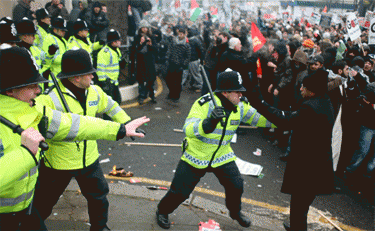Could a Tottenham happen here? And, if so where?
Here's a list of 14 large American cities that may be ready to erupt. They have been identified by sorting common social, economic and demographic data including: unemployment, education, income, crime, housing and homelessness.
Other data was also included that might indicate probable "flash points" igniting unrest. These include: cities with especially high rates of reported police misconduct, high disparity between rich and poor, city budget deficits threatening social services, high incidence of hate crime, and large differences in home values between neighborhoods.
One such statistic is a "Wealth Disparity Index" calculated as a "Gini" co-efficient. The index measures the inequality of the local wealth distribution. In this case, the closer the index number is to 1 the greater the disparity between the haves and have nots.
Should the American economy take another dive into "official recession" makes little difference if our cities and states become dysfunctional with a recovery that does not include jobs and a safety net to catch those victimized by an economic system based on fraud.
Why should the victims of economic tyranny turn to anger and action? It has been said that Americans are too self-absorbed to challenge the status quo. Even under the intolerable stress and life threatening situation of Hurricane Katrina cooler heads prevailed. For the most part, we are a patient people.
But at some point the fuse will be lit if economic relief is not forthcoming. The rationale may be factious as it was in Newark, NJ in 1967, when a rumor of police injustice sparked riots that lasted six days and nights. But when polite protests fail, as they did in London, action speaks louder than words.
As a young man said to an NBC news reporter in Tottenham: "You wouldn't be talking to me now if we didn't riot, would you?"
1. Detroit, MI:
The poster child for what has gone wrong with American capitalism. One way the city aims to increase revenue is to work with the state to identify businesses that have not been paying the city income tax, an initiative with the potential to generate $49.5 million over the next five years. Well, every little bit helps.
- Unemployment 21.6%
- Income per capita: $14,213
- Poverty: 36.4% of residents below the poverty line
- 56% of residents spend over 35% of their income on housing
- Percentage of single-parent households: 67.1%
- Homeless: 1,627/100,000 residents
- 3rd highest U.S. city crime score: 356.44
- High school graduation rate, public school district: 37.5%
- Deficit through FY2011: 710,000,000; per capita: $780
- 9th U.S. large city for police misconduct per capita
- 88,200 high net worth individuals
2. Miami, FL:
Here is a moderate example of economic schizophrenia at work. Commuters increase Miami's population 37.3% every work day, then leave the business district a ghost town every evening. Foreclosure paper work clogs a Miami courthouse with no end in sight. The city faces a $50 million budget deficit for 2012.
- Unemployment 13.7%
- Homeless: 1,191/100,000 residents
- 54.8% of residents spend over 35% of their income on housing
- Children living in poverty: 43.8
- Increase in food stamp (SNAP) use from 2007: 45%
- Percentage of single-parent households: 44.4%
- Residents with no health care insurance: 35%
- Housing value disparity: 136% (std. dev. / median)
- Wealth Inequity Index: 0.494 (Miami Metro)
- Share of aggregate income going to top 5 percent of households: 24.9%
- 18th U.S. city for police misconduct per capita
3. Cleveland, OH
According to The Plain Dealer: "People on the streets of Cleveland... say they are impatient with bullish economists and bickering politicians who don't seem to realize how little the economy has improved. They waved away questions about higher debt ceilings... because many of them wanted to vent about how much the economy stinks."
(Note: You can view every article as one long page if you sign up as an Advocate Member, or higher).





